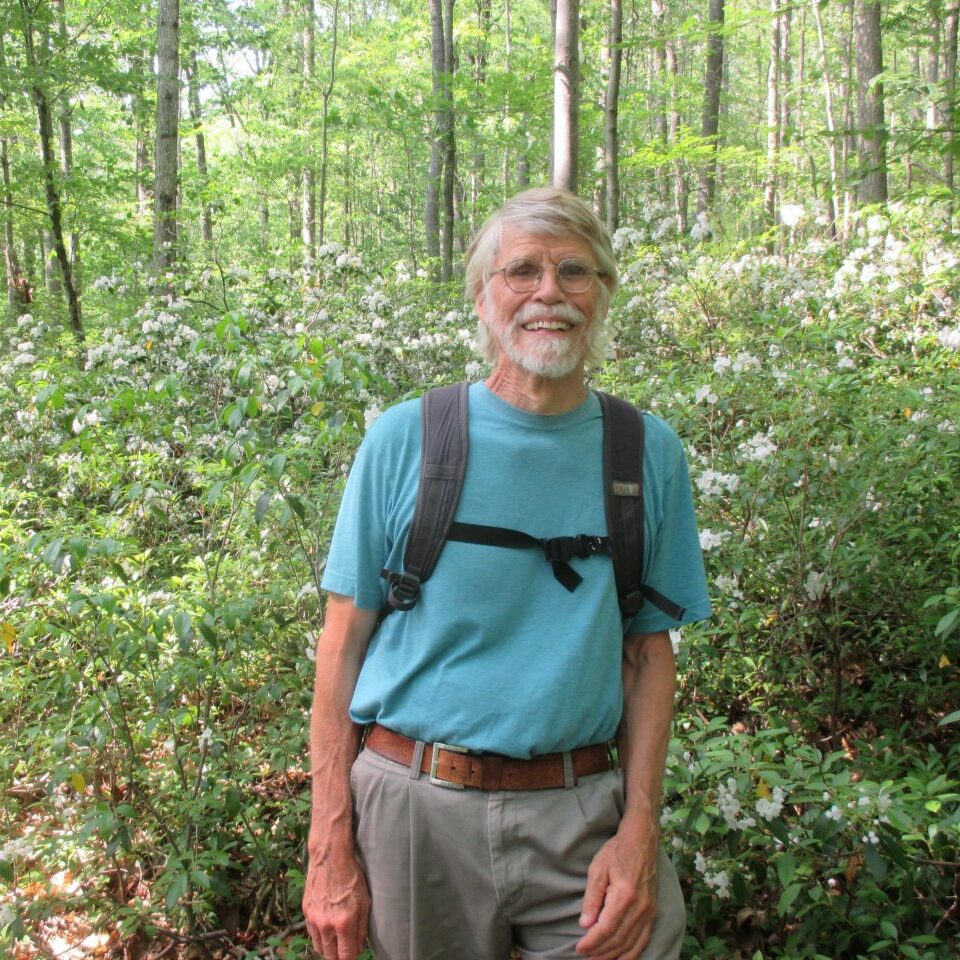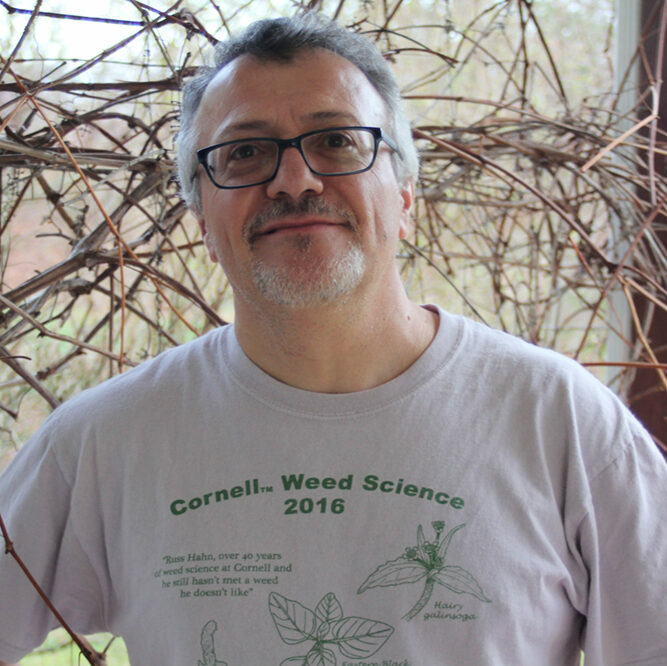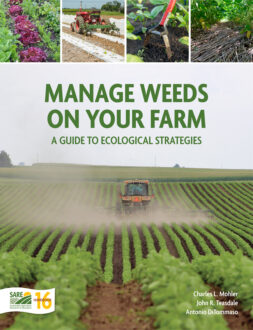
Charles (“Chuck”) Leon Mohler was a senior research associate in the Section of Soil and Crop Sciences, School of Integrative Plant Science, at Cornell University’s College of Agriculture and Life Sciences. Dr. Mohler was born in Salem, Ore., graduated from the University of Oregon in 1971 with a bachelor’s degree in biology, and obtained a doctorate in ecology and evolutionary biology from Cornell in 1979. Subsequently he became a close colleague and 20-year member of Professor Antonio DiTommaso’s Weed Ecology and Management Laboratory at Cornell. His research there produced new and innovative approaches to integrated weed management. His studies of the ecology of agricultural weeds and ecological methods of weed management made him a key innovator in this area of weed science. He examined the effects of tillage, cultivation and crop residue on weed control, testing his methods to make them hypothesis driven yet still practical. He wanted growers to be able to use the methods, and they did. He used some of these same approaches in the management of weeds in his extensive vegetable garden at home.
Dr. Mohler was instrumental in moving the field in this new direction of integrated weed management. Over time, younger researchers followed and improved on what he had done and on the standards he had set. These young students are now some of the top weed ecologists, and they were all influenced by his work. Dr. Mohler co-authored four books, including the highly acclaimed Ecological Management of Agricultural Weeds (2001) with co-authors Matt Liebman and Charles Staver. He also produced dozens of refereed scientific articles as well as a number of media presentations. He mentored numerous graduate and undergraduate students and visiting scholars. His significant contributions to the field of weed science were recognized when he received the Outstanding Researcher Award from the Northeastern Weed Science Society in 2014. Dr. Mohler died in 2021 at the age of 73.

John Teasdale is retired from the USDA Agricultural Research Service (ARS) at Beltsville, Md. He was born and raised in St. Paul, Minn., and received a doctorate in agronomy from the University of Wisconsin-Madison. After joining the ARS Weed Science Laboratory at Beltsville, he established a research program developing integrated weed management systems with an emphasis on understanding the interactions between cover crop management and weed emergence and growth dynamics. He developed a novel cover-crop-based, minimum-tillage system for vegetable production that served as a model for defining environmental, microbial community, physiological and molecular responses to conservation soil management practices. He was instrumental in the design and analysis of long-term cropping system experiments at Beltsville that established the importance of phenologically diverse crop rotations for organic farming. He played a leadership role in establishing the sustainable agriculture research program at Beltsville and served as the founding research leader for the ARS Sustainable Agricultural Systems Lab for 11 years until retirement. He currently lives in Bowie, Md., where he is the coordinator of a community garden that supports the Bowie Food Pantry, and he serves on city committees that advise municipal staff and elected officials on environmental and sustainability issues.

Antonio (“Toni”) DiTommaso is a professor of weed science and chair in the section of Soil and Crop Sciences in the School of Integrative Plant Science at Cornell University, where he has research and teaching responsibilities. He was born in southwestern Italy, but his family immigrated to Montreal when he was 9 years old. He received a bachelor’s degree in environmental sciences (1986) and a doctorate in weed ecology (1995) from McGill University in Montreal, as well as a master’s degree in plant ecology (1989) from Queen’s University in Kingston, Ontario. He joined Cornell as an assistant professor in 1999. His primary areas of scholarship focus on the effects of biotic and abiotic factors on the biology and ecology of important agricultural weeds (e.g., common ragweed, pigweeds) and introduced invasive plant species of natural and semi-natural areas (e.g., swallowworts) in the northeastern United States and southern Canada. His most recent work focuses on the impact of climate change, including drought and elevated temperatures on the ecology and evolution of weedy and invasive species and their potential geographic distributions. He has published extensively in scientific journals and has served as editor of the scientific journal Invasive Plant Science and Management since 2015. He served as the president and is a fellow of the Northeastern Weed Science Society. He is also co-author of the soon-to-be-published revised version of the popular weed identification guide, Weeds of the Northeast. DiTommaso, an avid gardener, currently lives with his family in Dryden, N.Y., where he enjoys growing fig plants (in pots) and multiple fruit trees.
In Memoriam – Charles L. Mohler
We dedicate this book to our dear friend, colleague, and coauthor, Charles “Chuck” Mohler. Unfortunately, Chuck passed away in April 2021 and was not able to witness his 15-year-long book project to its deserved culmination. Chuck was a unique individual in that he was not only a brilliant scientist able to produce some of the most innovative weed science research, but he could translate this often highly technical research into practical and useful information and advice for growers. Seeing or hearing of growers using his advice was undoubtedly one of the most satisfying aspects of his position as a weed scientist. Chuck lived a simple life and genuinely cared for people. He offered his help to anyone who asked for it and this assistance did not come with preconditions or expectation of repayment.
Chuck was in the vanguard of scientists that brought ecology to the forefront of a sustainable-based approach to weed science. He valued rigorous science and the scientific approach to solving applied aspects of weed science. Chuck was a great role model to so many aspiring and well-established scientists, and was generous with his time and knowledge.
Despite his failing eyesight during the latter years of this book project, Chuck never once mentioned that he could no longer finish this project, which was so important to him. Instead, he would just mention that his parts of the book might take “just a little longer to complete, but they will get done!” We certainly wish that Chuck could be with us to witness firsthand the very book he spent so many years thinking about and working on. We know that he would be most proud of this book and the positive impact that it will have for growers not only in the United States, but across the world, who are interested in ecological strategies for managing weeds!
Chuck, this is YOUR book and we are most grateful to have had the opportunity to assist you in this journey!
- Antonio DiTommaso, John Teasdale
